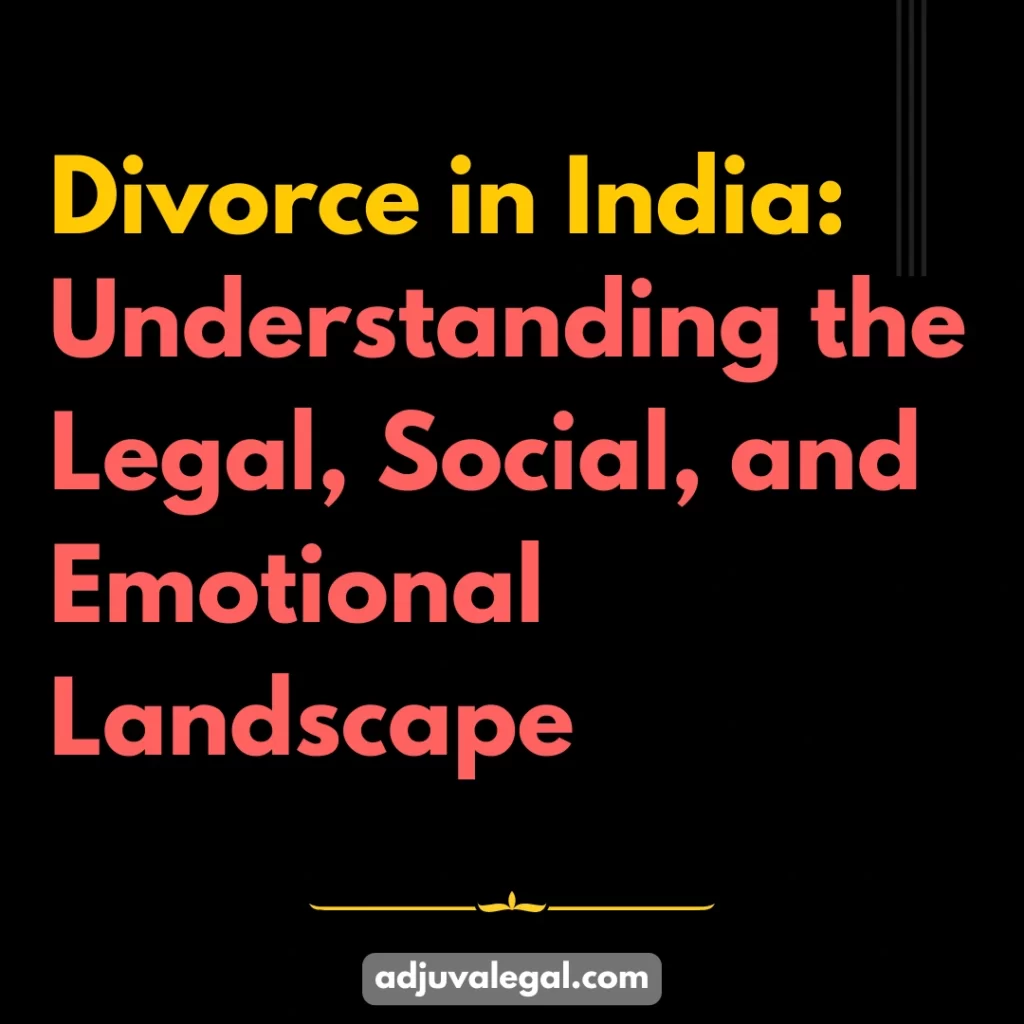1. Overview of Divorce Laws in India
History and Evolution
Divorce in India has evolved significantly over the years. Traditionally, the concept was almost non-existent in many communities, owing to strong societal norms and religious doctrines. However, with changing times, the Indian legal system has incorporated more progressive and practical laws to address marital dissolution. This evolution mirrors the societal transition towards accepting divorce as a legitimate end to irreconcilable marriages.
Current Legal Framework
The Indian legal system recognizes different personal laws for different religions governing marriage and divorce. For Hindus, Buddhists, Sikhs, and Jains, the Hindu Marriage Act, 1955 is applicable. Muslims are governed by the Muslim Personal Law (Shariat) Application Act, 1937, and Christians by the Indian Divorce Act, 1869. Additionally, the Special Marriage Act, 1954, applies to inter-religion marriages. These laws outline specific grounds and procedures for seeking divorce.
Types of Divorce Procedures
Divorce procedures in India can be broadly classified into ‘mutual consent divorce’ and ‘contested divorce’. Mutual consent divorce is where both spouses agree to dissolve the marriage amicably. Contested divorce occurs when one spouse desires the divorce while the other does not. This type usually involves specific grounds such as cruelty, desertion, conversion, mental disorder, etc.

2. Grounds for Divorce in Indian Law
Mutual Consent
Mutual consent is often the most straightforward ground for divorce. Couples agreeing on all terms including alimony, child custody, and property division can file for divorce jointly. The process typically involves filing a petition, a waiting period (usually of six months to one year), and then finalizing the divorce.
Contested Divorce: Common Grounds
In cases of contested divorce, common grounds include cruelty (both mental and physical), desertion for a continuous period, conversion to another religion, mental disorder, leprosy, venereal disease, and presumption of death. Each of these grounds requires specific evidence and legal arguments to be presented in court.
3. The Legal Process of Divorce
Filing for Divorce
The process begins with filing a divorce petition in the appropriate family court. The petition should clearly state the grounds for divorce and be supported by necessary documents and evidence.
Documentation and Legal Requirements
Essential documents typically include marriage certificates, proof of residence, income statements, and any evidence supporting the grounds for divorce. Legal requirements vary depending on the type of divorce and the personal laws applicable.
The Role of Family Courts
Family courts in India are specialized courts dealing with matrimonial disputes. They aim to resolve such disputes in a more amicable and less adversarial manner. The court’s role extends beyond just legal adjudication; it often involves mediation and reconciliation efforts.
If you're feeling trapped in a dead marriage, don't give up! Reach out to Adjuva Legal today.
4. Divorce and Alimony
Determining Factors for Alimony
Alimony, also known as spousal support, is a crucial aspect of divorce settlements. Courts consider various factors like the spouse’s income, standard of living during the marriage, duration of the marriage, and the spouse’s ability to earn and maintain a similar lifestyle post-divorce. The aim is to ensure that the financially weaker spouse is not left destitute following the divorce.
Alimony Laws for Different Religions
The amount and nature of alimony vary across different personal laws. For instance, under Hindu law, alimony can be a one-time payment or a continuous payment, whereas, in Muslim law, there is a concept of ‘Mahr’ and maintenance under the ‘Sharia’ law.
5. Child Custody in Indian Divorce Cases
Legal Criteria for Custody Decisions
In Indian divorce cases, the welfare of the child is the paramount consideration in awarding custody. Courts consider factors such as the age and sex of the child, the parent’s ability to nurture the child, and in some cases, the child’s own preferences.
Impact on Children
Divorce can significantly impact children, affecting their mental and emotional well-being. It’s vital to address their needs sensitively, ensuring minimal disruption to their routine and emotional support throughout the process.
6. Property Division and Financial Settlements
Legal Guidelines for Property Division
The division of property in Indian divorce cases is typically based on the type of property and its acquisition. Courts generally follow the principle of equitable distribution, considering contributions made by each spouse.
Negotiating Financial Settlements
Negotiations in financial settlements involve discussions on properties acquired before and during the marriage, joint investments, and liabilities. Legal guidance is crucial to ensure a fair and just settlement.
7. The Role of Lawyers and Legal Advisors
Choosing the Right Legal Assistance
Selecting an experienced and knowledgeable lawyer is crucial in navigating the complexities of divorce. The right legal advisor can offer guidance, represent you in court effectively, and help in negotiating settlements.
Cost and Duration of Legal Proceedings
The cost and duration of divorce proceedings in India vary based on the complexity of the case, the court’s workload, and the efficiency of legal representation. Contested divorces usually take longer and are more expensive than mutual consent divorces.
8. Counselling and Mediation in Divorce
Importance of Counselling
Counselling plays a critical role in the divorce process in India. It helps individuals deal with emotional turmoil and offers guidance in making informed decisions. Counselling can also assist couples in exploring the possibility of reconciliation or amicable separation.
Mediation as an Alternative
Mediation is an alternative dispute resolution method that is increasingly being encouraged in India. It involves a neutral third party helping the couple reach a mutually acceptable agreement. Mediation is less adversarial, often quicker, and less emotionally taxing than a contested divorce.
9. Social Stigma and Cultural Perceptions
Societal Attitudes Toward Divorce
Divorce in India is still viewed negatively by many, leading to social stigma. This stigma can be more pronounced for women, often affecting their ability to rebuild their lives post-divorce.
Navigating Social Challenges
Dealing with societal perceptions requires a strong support system and a positive mindset. Emphasizing individual well-being and seeking support from friends, family, and support groups can be beneficial.
10. Emotional Impact of Divorce
Coping Mechanisms
The emotional impact of divorce can be profound. Coping mechanisms include seeking professional counselling, engaging in self-care activities, and building a supportive social network.
Seeking Emotional Support
Building a strong emotional support system is crucial. This can include friends, family, support groups, and professional therapists. It’s important to remember that seeking help is a sign of strength, not weakness.
Struggling with the emotional weight of divorce? Reach out to our professional counsellors for support.
11. Divorce and Women in India
Unique Challenges Faced by Women
Women in India face unique challenges in divorce, including financial dependency, custody battles, and societal stigma. These challenges are often compounded for women with limited education and those who are homemakers.
Legal and Social Support Systems
There are various legal and social support systems in place to assist women through divorce. These include legal aid services, counselling centres, and NGOs working for women’s rights.
12. Rebuilding Life After Divorce
Personal Development and Growth
Post-divorce life can be a journey of personal growth and self-discovery. Engaging in new activities, pursuing hobbies, and focusing on career development can be empowering.
Starting Afresh
Starting afresh after divorce involves embracing the new phase of life with optimism. It might mean new living arrangements, exploring new relationships, and finding new meanings in life.

13. Legal Reforms and Future Directions
Recent Legal Changes
India has witnessed several legal reforms aimed at making divorce processes more equitable and less cumbersome. These include amendments to various personal laws and the introduction of more progressive judgments by the higher courts.
Proposed Amendments
Proposed amendments in the divorce laws focus on issues like simplifying legal procedures, reducing the waiting period for mutual consent divorces, and addressing the financial security of women post-divorce.
14. Case Studies: Divorce in Indian Courts
Notable Cases and Their Impact
Several landmark cases in Indian courts have shaped the current divorce laws. These cases often set precedents, particularly in areas like alimony, child custody, and division of assets.
Learning from Case Studies
Analysing these case studies provides insights into the legal reasoning and judicial approaches in matrimonial disputes. They also help understand the practical implications of laws.
15. International Divorce and NRI Marriages
Legal Considerations
For Non-Resident Indians (NRIs), divorce involves additional legal complexities, including jurisdiction issues and enforcement of foreign decrees in India.
Handling Cross-Border Complications
Handling divorces in NRI marriages requires understanding both Indian and foreign divorce laws. It often involves intricate legal procedures and international legal assistance.
16. Role of NGOs and Support Groups
Available Resources
Non-Governmental Organizations (NGOs) and support groups play a significant role in assisting those going through a divorce. They offer legal aid, counselling, and support groups.
Success Stories
Success stories from individuals who have navigated the divorce process with the help of these organizations can be inspirational. They highlight the importance of support systems in overcoming challenges.
17. Financial Planning and Management Post-Divorce
Budgeting and Financial Independence
Post-divorce, financial independence becomes crucial. Effective budgeting, financial planning, and understanding personal finance are essential skills to develop.
Investment and Savings Strategies
Investing wisely and saving for the future are key aspects of financial management post-divorce. Seeking advice from financial experts can be beneficial in this regard.
18. The Impact on Extended Families
Dealing with Relatives
Divorce can affect the broader family dynamics. Managing relationships with relatives and protecting the emotional well-being of extended family members is important.
Protecting Relationships
Protecting relationships within the extended family requires open communication, setting boundaries, and sometimes mediation to resolve conflicts.
How much divorce lawyer cost? Is divorce lawyer fees tax deductible? What is a divorce lawyer fee near me?
19. Dating and Remarriage
Social Norms and Acceptance
In India, the societal acceptance of dating and remarriage after divorce varies significantly. While urban areas are becoming more liberal, traditional views still prevail in many parts of the country. Understanding and navigating these social norms is crucial for individuals looking to start new relationships.
Legal Implications of Remarriage
Remarriage has legal implications, especially regarding alimony, child custody, and inheritance. It’s important to be aware of these legal aspects and how they might affect one’s life post-divorce.
20. Children’s Perspective on Parental Divorce
Understanding from a Child’s Point of View
Children experience divorce differently than adults. Their understanding and reactions are influenced by their age, personality, and the circumstances of the divorce. Recognizing and addressing their perspective is vital to their emotional health.
Supporting Children Through the Process
Supporting children through the divorce process involves open communication, reassurances of love and stability, and sometimes professional counselling. Ensuring that children feel secure and heard is paramount.
21. Mental Health Considerations
Dealing with Stress and Depression
Divorce can lead to significant stress and depression for the individuals involved. Recognizing these emotional states and addressing them through professional help, lifestyle changes, and support systems is essential.
Seeking Professional Help
Seeking professional help from psychologists or counsellors is crucial in managing mental health challenges during and after divorce. They provide strategies and support for coping with the changes and emotional upheaval.
22. The Role of Social Media in Divorce
Influence on Personal and Legal Aspects
Social media can significantly impact divorce proceedings, both personally and legally. Online behaviour and posts can sometimes be used as evidence in court. Managing one’s digital footprint and understanding the implications of online activities is important.
Managing Online Presence
Navigating social media during and after a divorce requires caution and discretion. It’s advisable to maintain privacy and avoid sharing sensitive information that could affect the divorce process or personal well-being.
23. Gender Dynamics in Divorce Proceedings
Male vs. Female Perspectives
The experience of divorce can be different for men and women, influenced by societal roles, financial situations, and custody matters. Understanding these gender dynamics is important in addressing the specific challenges faced by each gender.
Legal Biases and Fairness
There is an ongoing debate about legal biases in divorce proceedings. Ensuring fairness and equity for both genders in legal matters like alimony, child custody, and property division is a continuous challenge.
24. Religious Variations in Divorce Practices
Hindu, Muslim, Christian Divorces
Different religions in India have varied practices and laws regarding divorce. Understanding these variations is important, especially in cases involving interfaith marriages.
Unique Religious Laws
Each religion has unique laws that govern divorce, such as the Hindu Marriage Act for Hindus and the Muslim Personal Law for Muslims. These laws affect the divorce process, alimony, custody, and other aspects.
25. Public Awareness and Education
Information Campaigns
Increasing public awareness about the legal rights and support available during divorce is essential. Information campaigns can help dispel myths and reduce the stigma associated with divorce.
Role of Media and Education
The media and educational institutions play a crucial role in shaping public perception about divorce. Responsible reporting and educational programs can foster a more understanding and supportive environment for those going through a divorce.
Conclusion
Divorce in India, while legally defined, is a multifaceted issue that intertwines with social, emotional, and cultural strands. Navigating this landscape requires not only legal knowledge but also an understanding of its broader impacts. This comprehensive overview aims to provide a holistic understanding of the complexities of divorce in India, offering insights and guidance for those facing this challenging journey.
Author – Saket Sambhav and Utkarsh Srivastava, founders, Adjuva Legal.
Disclaimer: The opinions expressed within this article are the personal opinions of the author. The facts and opinions appearing in the article do not reflect the views of Adjuva Legal and Adjuva Legal does not assume any responsibility or liability for the same.
Ready to start a new chapter of your life?
FAQs on Divorce in India
Most frequent questions and answers
The duration varies depending on whether it’s a mutual consent divorce or a contested one. Mutual consent divorces typically take about 6 to 18 months, whereas contested divorces can take several years.
In a contested divorce, one spouse can indeed refuse to grant a divorce. In such cases, the court examines the grounds for divorce and makes a decision based on the merits of the case.
Child custody is determined based on the best interests of the child. Courts consider various factors including the child’s age, parent’s ability to care for the child, and sometimes the child’s preference.
Yes, there are pre-divorce counselling services available, often provided by family courts, NGOs, and private counselling centres.
The financial implications can include entitlement to alimony, division of marital property, and child support. However, these depend on various factors including the woman’s financial status and the terms of the divorce.
Rebuilding social life post-divorce involves expanding social networks, engaging in new activities, and sometimes seeking the help of support groups or counselling services.







